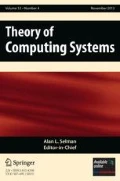Abstract.
In this paper we introduce a new polynomial-time approximation scheme preserving reducibility, which we call PTAS-reducibility, that generalizes previous definitions. As a first application of this generalization, we prove the APX-completeness under PTAS-reducibility of a polynomially bounded optimization problem, that is, an APX problem whose measure function is bounded by a polynomial in the length of the instance and such that any APX problem is PTAS-reducible to it. As far as we know, no such problem was known before. This result combined with results of Khanna et al. allows us to infer that several natural optimization problems are APX-complete under PTAS-reducibility, such as MAX CUT and MAX SAT. Successively, we apply the notion of APX-completeness under PTAS-reducibility to the study of the relative complexity of evaluating an r -approximate value and computing an r -approximate solution for any r . We first show that if P \(\neq\) NP \(\cap\) co NP, then the former question can be easier than the latter even if the optimization problem is NP-hard. We then give strong evidence that if an optimization problem is APX-complete under PTAS-reducibility, then the two questions are both hard.
Similar content being viewed by others
Author information
Authors and Affiliations
Additional information
Received February 15, 1996, and in final form May 28, 1999.
Rights and permissions
About this article
Cite this article
Crescenzi, P., Trevisan, L. On Approximation Scheme Preserving Reducibility and Its Applications. Theory Comput. Systems 33, 1–16 (2000). https://doi.org/10.1007/s002249910001
Issue Date:
DOI: https://doi.org/10.1007/s002249910001




